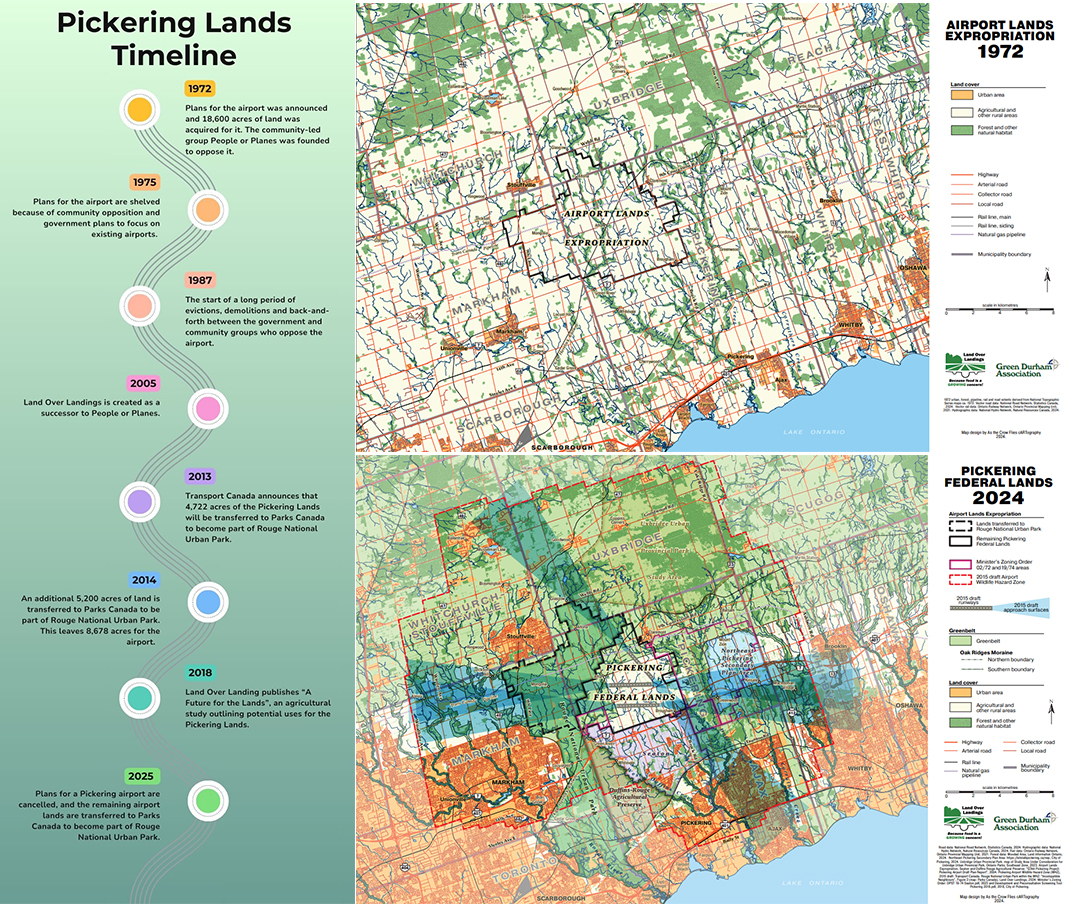Plans for an airport in Pickering have been cancelled more than 50 years after they were first announced. The lands have been transferred to Parks Canada to become part of the Rouge National Urban Park.

Pickering Mayor Kevin Ashe said the next steps will include consultations with various community organizations and residents about how the land should be used.
Although no specific timeline was released, Mayor Ashe said he hopes the plans get put in progress soon, especially with the upcoming provincial and federal elections.
“ My only concern is we’re most likely at the end of a minority parliament and an election will cause some uncertainty,” he said.
The decision to cancel the airport comes after a long struggle from locals. Land Over Landings is one of the most involved advocacy groups, fighting for the farmland and natural spaces in the area to be conserved.
Land Over Landings was formed as a successor to another group, People or Planes, which was founded in the same year the airport was first announced. In an article on the Land Over Landings website, they say their advocacy has been described as the “longest continuous protest movement in Canada’s history,” as the community has been working to stop the airport for over half a century.

According to Alexis Whalen, chair of Land Over Landings, members were concerned about noise pollution, industrial sprawl and increased runoff caused by paving the lands.
In 2013, a portion of the land was allocated to be part of Rouge National Urban Park and Whalen’s group was also concerned about the damage the airport might cause to these lands.
“ If an airport were ever to be built on those federal lands, it would violate and contradict the mandate of the National Park,” Whalen said. “Airports require wildlife, birds in particular, to be controlled in their area for the safety of takeoff and landing. So you can see that those side-by-side neighbours would conflict going forward.”
Many locals were against the airport because of the evictions required, pushing people out of family homes and turning farmland into urbanized land. However, from a business perspective, the airport represented a chance to help grow Durham Region’s industry.
Stephen Wilcox, airport manager at the Oshawa Executive Airport, said the Pickering airport would have filled an important gap in service.
The Oshawa airport is one of the 20 busiest airports in Canada by air traffic, according to Wilcox, with a lot of business activity, MedEvac services, flight training and more. Due to its size, the Oshawa airport cannot support passenger flights and the growth has been limited.
“With that in mind, Oshawa for the last 20 years has positioned itself as an incubator for the Pickering Airport,” Wilcox said, explaining that the idea was for Oshawa to serve the region until something better came along in Pickering.
He pointed out that many large cities in North America have multiple supporting airports surrounding their main airports. Toronto’s Pearson Airport is a notable exception to this, according to Wilcox.
Now that the Pickering airport has been cancelled, he said Oshawa Executive will have to step up to keep things running smoothly, adapting plans so it can continue to function as the only airport in the region.
“There is no doubt that a Pickering airport could have served Durham Region and the east side of Toronto better than Oshawa can,” he said. “But we’ll certainly continue to serve it the best we can.”
Land Over Landing is holding a celebratory event in Claremont on March 1, but Whalen said that although the airport cancellation is a step forward, there is still a lot to be done during the consultation phase.
“The work of creating a really wholesome, dynamic park experience that serves the population that surrounds it, that will only happen with deep engagement from area residents and stakeholders,” she said.
A press release from Transport Canada said the consultation process will involve existing tenants, Indigenous communities and the public and will be launched in the coming weeks.
Ontario Regional Chief Abram Benedict said these consultations are extremely important, especially with First Nations communities, because of legal and ethical considerations. He said this could also lead to continued partnerships or collaborations going forward.
“Our First Nations want to be involved in economic opportunities as well,” he said. “If these lands are being converted for the purpose of business ventures, I think First Nations need to be involved in that conversation, but also have to have an equity stake in that.”
Whalen encouraged residents to stay tuned to Parks Canada news for updates on when they can share their voice in the consultation process.




